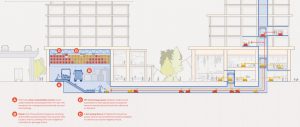Alphabet’s plan for a new waterfront city in Toronto includes a standard smart container for last-mile logistics. Sidewalk Labs unveiled its Master Innovation and Development Plan to transform the site into the most innovative district in the world, with a network of sensors generating data on how people, goods, and vehicles move throughout the new community.
Simple ideas like lockers and cargo bikes could make the neighborhood more lovely, green, quiet, and livable, according to researcher Anne Goodchild. With regard to last-mile logistics, the plan revisits how the ISO 20’ and 40’ shipping containers revolutionalized global trade while noting that last-mile delivery still relies on the cardboard box.
Sidewalk Labs notes that various innovations are currently being tested for last-mile delivery vehicles, but claims all of these ideas have incorporated the cargo into the vehicle itself, which misses the core insight of the long-haul shipping container: that the storage compartment should be separate from the vehicle, freeing each to evolve independently over time.
Containers for urban freight
Sidewalk Labs plans to develop standardized “smart containers” as the 21st-century urban equivalent for last-mile delivery. The smart containers would form the basis of last mile delivery at Quayside city. Goods would be unpacked from ISO containers and trucks at a neighborhood logistics hub and sorted into smart containers for delivery. Multiple packages for the same address could be combined and sent at once, and perishable goods could be chilled and sent quickly when required.
Smart containers could be handled by a variety of delivery vehicles, from cargo bikes to traditional trucks to autonomous vehicles, so that cities that have not yet embraced autonomous transportation can still use them. These durable containers would be stackable, enabling them to function as lockers and to be placed easily onto delivery vehicles. They would also be embedded with location-based capabilities to track movements.
Sidewalk Labs also envisages using the smart containers to return goods, send items to storage, and send garbage and recycling to central locations. All the containers would have a tracking system and could be controlled and re-routed as required.
Urban freight network
As to how the containers would be transported between the logistics hub and buildings, Sidewalk Labs plans to deploy electric self-driving delivery dollies that resemble a large Roomba. These dollies can transport individual smart containers or a set of containers stacked to form a mobile locker system.
The self-driving delivery dollies would transport the smart containers in purpose-built tunnels. These would be two meters in diameter, allowing for two way traffic. The tunnel concept has particular appeal in Toronto, where winter weather is a major obstacle to ground-based delivery robots. The tunnels would be integrated into buildings to make the whole last-mile logistics system completely internal.
Source: SideWalk Labs
Picture source: Sidewalk Labs

